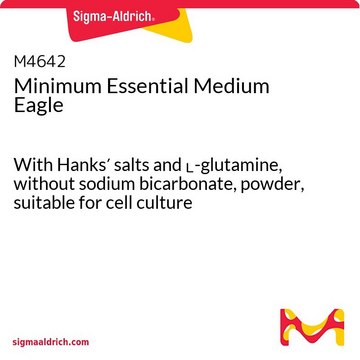51412C
Minimum Essential Medium
with Earle′s Balanced Salts, without L-glutamine, liquid, sterile-filtered, suitable for cell culture
Synonym(s):
Minimum Essential Medium Eagle, MEM
Sign Into View Organizational & Contract Pricing
All Photos(1)
About This Item
UNSPSC Code:
12352207
NACRES:
NA.75
Recommended Products
description
for research or for further manufacturing use
sterility
sterile-filtered
form
liquid
technique(s)
cell culture | mammalian: suitable
cell culture | stem cell: suitable
components
L-glutamine: no
NaHCO3: 2200 mg/L
phenol red: 10.62 mg/L
Earle’s salts (5% CO2): yes
storage temp.
2-8°C
Looking for similar products? Visit Product Comparison Guide
General description
Minimum Essential Medium (MEM) with Earle′s Balanced Salts was developed by Harry Eagle as a result of his studies to determine the essential nutritional requirements of mouse L cells and HeLa cells in culture. He demonstrated that these cells require 13 amino acids and seven vitamins to grow and reproduce in vitro. MEM is a modification of Eagle′s earlier medium Basal Medium Eagle (BME), containing higher concentrations of the essential nutrients. This medium has demonstrated the ability to support a variety of normal and transformed cells in culture and contains Earle′s Balanced Salts, which makes it suitable for use in atmospheres charged with CO2 gas.
Application
Minimum essential medium (MEM) has been used as a growth medium for bone marrow mesenchymal stem cells (BMSCs) and neurons.
Storage Class Code
12 - Non Combustible Liquids
WGK
WGK 1
Flash Point(F)
Not applicable
Flash Point(C)
Not applicable
Personal Protective Equipment
dust mask type N95 (US), Eyeshields, Gloves
Choose from one of the most recent versions:
Already Own This Product?
Find documentation for the products that you have recently purchased in the Document Library.
Customers Also Viewed
A novel pulsed STED microscopy method using FastFLIM and the phasor plots.
Sun Y, et al.
Proceedings of SPIE (2017)
Involvement of microRNA-23b in TNF-?-reduced BMSC osteogenic differentiation via targeting runx2.
Deng L, et al.
Journal of Bone and Mineral Metabolism, 1-13 (2017)
Debora Soncini et al.
Blood advances, 4(18), 4312-4326 (2020-09-12)
Metabolic reprogramming is emerging as a cancer vulnerability that could be therapeutically exploitable using different approaches, including amino acid depletion for those tumors that rely on exogenous amino acids for their maintenance. ʟ-Asparaginase (ASNase) has contributed to a significant improvement
Agata Nowacka et al.
Scientific reports, 10(1), 2054-2054 (2020-02-08)
PSD-95 is a major scaffolding protein of the post-synaptic density (PSD) of a glutamatergic synapse. PSD-95, via interactions with stargazin, anchors AMPA receptors at the synapse and regulates AMPAR currents. The expression of PSD-95 is regulated during synaptic plasticity. It
Dirk M Reiter et al.
PLoS pathogens, 7(8), e1002166-e1002166 (2011-08-11)
Many viruses attach to target cells by binding to cell-surface glycans. To gain a better understanding of strategies used by viruses to engage carbohydrate receptors, we determined the crystal structures of reovirus attachment protein σ1 in complex with α-2,3-sialyllactose, α-2,6-sialyllactose
Our team of scientists has experience in all areas of research including Life Science, Material Science, Chemical Synthesis, Chromatography, Analytical and many others.
Contact Technical Service



